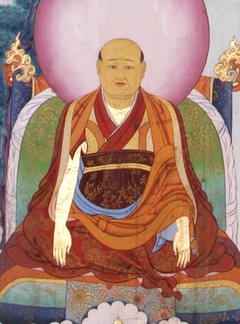Advice in Sets of Three
English | Deutsch | Français | བོད་ཡིག
The Precious Treasury of Written Instruction Transmitted One-to-One
by Patrul Rinpoche
This is for my son Śrī to keep in mind.
Three things must not be forgotten:
The gracious guru,
The compassionate Buddha,
And mindfulness and vigilance.
Three things must be recalled:
The preceptor who transmitted the precepts,
The teachings that reveal those precepts,
And the commitments and vows to be upheld.
Three things must be present:
The mind in the body,
The body on its seat,
And the mind in relaxation.
Three things are best forgotten:
Hated enemies,
The objects of desire,
And dullifying sleep.
Three things are best kept under control:
Your mouth when at gatherings,
Your hands when alone,
And your mind at all times.
Three things must be kept secret:
Your own virtues,
The faults of others,
And plans for the future.
Three things should not be flaunted:
Momentary renunciation,
Deceptive ploys,
And cursory deeds of virtue.
Three places are best avoided:
Hostile crowds,
Large gatherings,
And venues of games.
Three things are not to be divulged:
Dharma to the apathetic,
Histories to the unfamiliar,
And talk of the impossible.
Three things are uncalled for:
Moodiness toward friends,
Inconsistencies in reports,
And duplicity in dealings.
Three things should be avoided:
Gestures of self-importance,
Backbiting,
And derision of anyone.
Three things should not be surrendered:
Resources to the privileged,
Trust to charlatans,
And heart-secrets to anyone.
Three things should not be examined closely:
A beauty’s physique,
A friend’s actions,
And one’s own qualities.
Three things should be in accord:
Conversation with friends,
Clothing with location,
And mind with the Dharma.
Three things should go unheeded:
Praise from others,
Fanciful talk,
And ill-considered advice.
Three things are not to be yearned for:
The riches of the wealthy,
Privileges of the high-ranking,
And ornaments of the glamorous.
Three things should not be criticized:
Local celebrities,
Wares that others are peddling,
And friends who have been kind.
Three types of person should not be praised:
One who is universally condemned,
A self-regarding fool,
And a child who knows nothing.
Three types of person should neither be praised nor criticized:
One’s own close relations,
An unfamiliar lama,
And anyone else at all.
There are many such statements, but what they all boil down to is this: Always examine yourself. Don’t forget this. It includes both the Dharma and mundane ethics. It is the instruction in a single statement and is extremely profound.
This is the advice of the yogi Drimé Lodrö for his son Śrī,[1] who is as dear as his own heart, so put it into practice. May virtue abound.
| Translated by Adam Pearcey, 2021.
Bibliography
Tibetan Edition
o rgyan 'jigs med chos kyi dbang po. "chig brgyud man ngag gi yi ge rin po che'i mdzod/" in gsung 'bum/_o rgyan 'jigs med chos kyi dbang po. BDRC W1PD107142. 8 vols. khreng tu'u: si khron dpe skrun tshogs pa/ si khron mi rigs dpe skrun khang, 2009. Vol. 8: 171–173
Version 1.2-20230421
-
Here Patrul Rinpoche playfully uses two of his own names, Drimé Lodrö and Śrī—Sanskrit for the Pal (dpal) in Paltrul (or Patrul)—as this is advice he gave to himself. ↩
